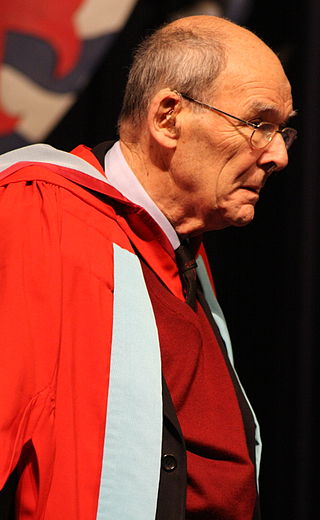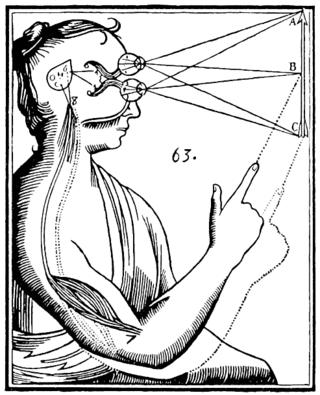
David Hume was a Scottish Enlightenment philosopher, historian, economist, librarian, and essayist, who is best known today for his highly influential system of philosophical empiricism, scepticism, and naturalism. Beginning with A Treatise of Human Nature (1739–40), Hume strove to create a naturalistic science of man that examined the psychological basis of human nature. Hume argued against the existence of innate ideas, positing that all human knowledge derives solely from experience. This places him with Francis Bacon, Thomas Hobbes, John Locke, and George Berkeley as an empiricist.

The mind is the set of faculties responsible for all mental phenomena. Often the term is also identified with the phenomena themselves. These faculties include thought, imagination, memory, will, and sensation. They are responsible for various mental phenomena, like perception, pain experience, belief, desire, intention, and emotion. Various overlapping classifications of mental phenomena have been proposed. Important distinctions group them according to whether they are sensory, propositional, intentional, conscious, or occurrent. Minds were traditionally understood as substances but it is more common in the contemporary perspective to conceive them as properties or capacities possessed by humans and higher animals. Various competing definitions of the exact nature of the mind or mentality have been proposed. Epistemic definitions focus on the privileged epistemic access the subject has to these states. Consciousness-based approaches give primacy to the conscious mind and allow unconscious mental phenomena as part of the mind only to the extent that they stand in the right relation to the conscious mind. According to intentionality-based approaches, the power to refer to objects and to represent the world is the mark of the mental. For behaviorism, whether an entity has a mind only depends on how it behaves in response to external stimuli while functionalism defines mental states in terms of the causal roles they play. Central questions for the study of mind, like whether other entities besides humans have minds or how the relation between body and mind is to be conceived, are strongly influenced by the choice of one's definition.
In philosophy, physicalism is the metaphysical thesis that "everything is physical", that there is "nothing over and above" the physical, or that everything supervenes on the physical. Physicalism is a form of ontological monism—a "one substance" view of the nature of reality as opposed to a "two-substance" (dualism) or "many-substance" (pluralism) view. Both the definition of "physical" and the meaning of physicalism have been debated.

Hilary Whitehall Putnam was an American philosopher, mathematician, and computer scientist, and a major figure in analytic philosophy in the second half of the 20th century. He made significant contributions to philosophy of mind, philosophy of language, philosophy of mathematics, and philosophy of science. Outside philosophy, Putnam contributed to mathematics and computer science. Together with Martin Davis he developed the Davis–Putnam algorithm for the Boolean satisfiability problem and he helped demonstrate the unsolvability of Hilbert's tenth problem.
Colin McGinn is a British philosopher. He has held teaching posts and professorships at University College London, the University of Oxford, Rutgers University, and the University of Miami.

Mary Beatrice Midgley was a British philosopher. A senior lecturer in philosophy at Newcastle University, she was known for her work on science, ethics and animal rights. She wrote her first book, Beast and Man (1978), when she was in her late fifties, and went on to write over 15 more, including Animals and Why They Matter (1983), Wickedness (1984), The Ethical Primate (1994), Evolution as a Religion (1985), and Science as Salvation (1992). She was awarded honorary doctorates by Durham and Newcastle universities. Her autobiography, The Owl of Minerva, was published in 2005.

Ted Honderich is a Canadian-born British professor of philosophy, who was Grote Professor Emeritus of the Philosophy of Mind and Logic, University College London.
Raymond C. Tallis is a philosopher, poet, novelist, cultural critic and a retired medical physician and clinical neuroscientist. Specialising in geriatrics, Tallis served on several UK commissions on medical care of the aged and was an editor or major contributor to two key textbooks in the field, The Clinical Neurology of Old Age and Textbook of Geriatric Medicine and Gerontology.

David Malet Armstrong, often D. M. Armstrong, was an Australian philosopher. He is well known for his work on metaphysics and the philosophy of mind, and for his defence of a factualist ontology, a functionalist theory of the mind, an externalist epistemology, and a necessitarian conception of the laws of nature. He was elected a Foreign Honorary Member of the American Academy of Arts and Sciences in 2008.
Jaegwon Kim was a Korean-American philosopher. At the time of his death, Kim was an emeritus professor of philosophy at Brown University. He also taught at several other leading American universities during his lifetime, including the University of Michigan, Cornell University, the University of Notre Dame, Johns Hopkins University, and Swarthmore College. He is best known for his work on mental causation, the mind-body problem and the metaphysics of supervenience and events. Key themes in his work include: a rejection of Cartesian metaphysics, the limitations of strict psychophysical identity, supervenience, and the individuation of events. Kim's work on these and other contemporary metaphysical and epistemological issues is well represented by the papers collected in Supervenience and Mind: Selected Philosophical Essays (1993).

Environmental philosophy is a branch of philosophy that is concerned with the natural environment and humans' place within it. It asks crucial questions about human environmental relations such as "What do we mean when we talk about nature?" "What is the value of the natural, that is non-human environment to us, or in itself?" "How should we respond to environmental challenges such as environmental degradation, pollution and climate change?" "How can we best understand the relationship between the natural world and human technology and development?" and "What is our place in the natural world?" Environmental philosophy includes environmental ethics, environmental aesthetics, ecofeminism, environmental hermeneutics, and environmental theology. Some of the main areas of interest for environmental philosophers are:
Metaphysical naturalism is a philosophical worldview which holds that there is nothing but natural elements, principles, and relations of the kind studied by the natural sciences. Methodological naturalism is a philosophical basis for science, for which metaphysical naturalism provides only one possible ontological foundation. Broadly, the corresponding theological perspective is religious naturalism or spiritual naturalism. More specifically, metaphysical naturalism rejects the supernatural concepts and explanations that are part of many religions.

Jeremy Stangroom is a British writer, editor, and website designer. He is an editor and co-founder, with Julian Baggini, of The Philosophers’ Magazine, and has written and edited several philosophy books. He is also co-founder, with Ophelia Benson of the website 'Butterflies and Wheels'.

Peter Michael Stephan Hacker is a British philosopher. His principal expertise is in the philosophy of mind, philosophy of language, and philosophical anthropology. He is known for his detailed exegesis and interpretation of the philosophy of Ludwig Wittgenstein, his critique of cognitive neuroscience, and for his comprehensive studies of human nature.

Philosophy of mind is a branch of philosophy that studies the ontology and nature of the mind and its relationship with the body. The mind–body problem is a paradigmatic issue in philosophy of mind, although a number of other issues are addressed, such as the hard problem of consciousness and the nature of particular mental states. Aspects of the mind that are studied include mental events, mental functions, mental properties, consciousness and its neural correlates, the ontology of the mind, the nature of cognition and of thought, and the relationship of the mind to the body.

The mind–body problem is a philosophical debate concerning the relationship between thought and consciousness in the human mind, and the brain as part of the physical body. The debate goes beyond addressing the mere question of how mind and body function chemically and physiologically. Interactionism arises when mind and body are considered as distinct, based on the premise that the mind and the body are fundamentally different in nature.

Peter Carruthers is a British-American philosopher and cognitive scientist working primarily in the area of philosophy of mind, though he has also made contributions to philosophy of language and ethics. He is a professor of philosophy at the University of Maryland, College Park, an associate member of Neuroscience and Cognitive Science Program, and a member of the Committee for Philosophy and the Sciences.

Julian Baggini is a philosopher, journalist and the author of over 20 books about philosophy written for a general audience. He is co-founder of The Philosophers' Magazine and has written for numerous international newspapers and magazines. In addition to writing on the subject of philosophy he has also written books on atheism, secularism and the nature of national identity. He is a patron of Humanists UK.
Thinking like a mountain is a term coined by Aldo Leopold in his book A Sand County Almanac. In the section entitled "Sketches Here and There" Leopold discusses the thought process as a holistic view on where one stands in the entire ecosystem. To think like a mountain means to have a complete appreciation for the profound interconnectedness of the elements in the ecosystems. It is an ecological exercise using the intricate web of the natural environment rather than thinking as an isolated individual.
In philosophy of mind, the extended mind thesis (EMT) says that the mind does not exclusively reside in the brain or even the body, but extends into the physical world. The EMT proposes that some objects in the external environment can be part of a cognitive process and in that way function as extensions of the mind itself. Examples of such objects are written calculations, a diary, or a PC; in general, it concerns objects that store information. The EMT considers the mind to encompass every level of cognition, including the physical level.












